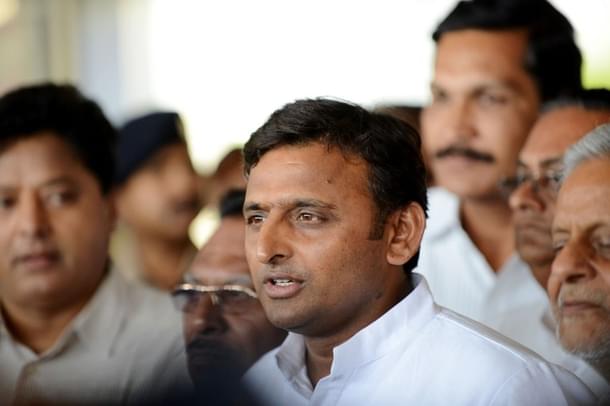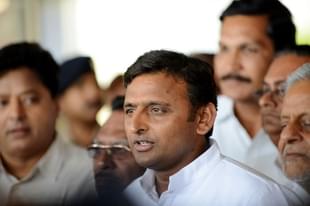Politics
Akhilesh Plays Trump Card Too Late
Dr A.K Verma
Nov 02, 2015, 08:17 PM | Updated Feb 11, 2016, 08:44 AM IST
Save & read from anywhere!
Bookmark stories for easy access on any device or the Swarajya app.


The recent shake-up of the Uttar Pradesh council of ministers seems like an attempt by Akhilesh Yadav to assert his authority. While a welcome step, it may just be too little, too late.
Politics is not about obtaining power only; it is also about retaining it. UP Chief Minister Akhilesh Yadav has played his trump-card for that. The next assembly elections are just about 15 months away and many suspect his ability to comeback. But, the most important person to so feel is his own father and Samajwadi Party President, Mulayam Singh Yadav who had repeatedly warned Akhilesh and his ministers publicly to mend ways or face the music at next hustling.
The earliest warning came a couple of months after the Akhilesh government assumed office. On 1 August 2012, Mulayam warned his MLA’s and ministers, “Nothing much has changed in the last two months. Everybody seems to be catering to their own interests…Don’t be surprised if you find an unexpected reshuffle in the cabinet if I don’t see a change soon.”
The next public warning came just before the 2014 Lok Sabha elections. On 12 October 2013, on an occasion to mark the 47th death anniversary of Dr. Ram Manohar Lohia, Mulayam said, “I am warning Akhilesh Yadav and other ministers that they should correct their mistakes”.
Repeating the warning at a function at Akhilesh’s residence on March 4, 2014, Mulayam especially lashed at Akhilesh and senior minister Azam Khan for ‘promoting sycophancy and inefficiency in government’.
And, very recently, on 23 August 2015 he stunned everyone at a Samajwadi Party meeting by saying that the party would meet an electoral disaster if ‘present state of affairs’ continued. “If things are not rectified, there will be a severe disaster. Officers are going berserk and ministers as well as party MLAs are inert. The party must read the writing on the wall.”
Has Akhilesh read the writings on the wall? Has he realised the gravity of warnings by the Samajwadi Party President? Is he prepared to take responsibility for his government’s failure on all fronts? Has he really taken Mulayam’s warnings seriously or, is he just trying to do cosmetic surgery through a major cabinet reshuffle?
The recent and sixth cabinet reshuffle by Akhilesh is different from previous ones; he dismissed some ministers, deprived others of portfolios, elevated the performers and brought some new faces. In so doing, he tried to signal to his own government, party and the people that he is now the real commander.
In removing ministers, he had done his homework meticulously by not only keeping in mind Mulayam’s charges of inefficiency, sycophancy and personal aggrandisement against ministers, but also considerations of caste. Out of eight removed ministers, 4 were from UC, 3 from OBCs and 1 from SC. Interestingly, no Muslim minister was removed. Those stripped of the charges included 3 Muslims, 3 OBCs, 2 UCs and 1 SC.
But, in his enlarged ministry, all the cabinet ministers stripped of their ministries have been retained. They all are ministers without portfolios. UP can have a maximum of 60 ministers: The Akhilesh ministry has now 58 ministers that includes 26 cabinet ministers, 11 ministers of state with independent charge and 21 ministers of state.
Akhilesh also kept considerations of social engineering in mind with a surprise move to woo Sikhs by importing Akali Dal leader Balwant Singh Ramoowalia from Punjab. But, one fails to understand why a sikh from Punjab, that too so aged, was inducted? Why not someone from UP and young, especially if he needed to infuse young blood in government? He demonstrated keenness to woo Shia Muslims by bringing in Shadab Fatima, a Shia; most Muslims in his ministry are from the Sunni community. Also interesting is the inclusion of a very poor Bansidhar Baudh, who was elected from Balha (Bahraich), and, reportedly, is landless and still tills a piece of land given by government on patta. The overall effort is to make the cabinet reshuffle look like he is making his government inclusive and efficient with appropriate signals to performers, non-performers and suspects in the government.
As regards the party, Akhilesh seem to have transcended the ‘father-uncle-syndrome’ of Mulayam-Shivpal-Azam and asserted his suzerainty in matters of setting his house in order for which he had a clear mandate from party supremo and his father, Mulayam. In a veiled warning to his uncle Shivpal, and to sternly deal with intra-party factionalism, Akhilesh dismissed Shiv Kumar Beria (SC minister, close to Shivpal) who had quarrels with another SC minister Aruna Kori. Not only that, by divesting three Muslims of their portfolios and yet retaining them in cabinet, he has given a subtle warning to Azam Khan not to communalise the political scenario before assembly elections, especially in light of a possible challenge from a new player Asaduddin Owaisi, President of All India Majlis-e-Ittehadul Muslimeen, who made his debut in the Bihar elections recently.
To the people, Akhilesh’s message is that he is fully in control of government and is focused on governance and development. Since Prime Minister Modi made electoral politics totally development-centric, there is hardly any option before any leader or chief minister but to plunge into competitive mode of development and governance. So, whether you like or not, you have to fall in line with Modi and take his challenge. That may ultimately bring cheer to the people.
Bihar elections are soon to be over and the results would be out. Whatever be its outcome, the battleground would surely, and very soon, shift to UP. BJP has a very big stake in the next UP elections. It has a large contingent of 71 MPs from UP. They will pose a big challenge to the SP government. If Bihar results go in favour of the BJP and the NDA allies, as many conjecture, then, that challenge would become all the more formidable.
Akhilesh has now very little time; he has frittered away 43 precious months. The party has not been able to deal with deterioration in law-and-order and rising crime-graph whenever it comes to power. It simply indulges in statistical rebuttals that do not work with people. The SP government is also charged with rampant casteism, especially, ‘Yadavisation’. In most recruitments, there is an undue proportion of Yadavs and many plum postings are given to Yadavs only. Corruption as usual is patronised by ministers.
In this backdrop of rising criminality, rampant corruption and nepotism, a cabinet reshuffle could only be seen as a cosmetic surgery. Where is the delivery? All claims of development get marginalised when government patronises criminality and corruption. Mulayam’s warnings have been heeded, if at all, very late by Akhilesh Yadav government in UP: the writing on the wall for his government is very clear.
A K Verma is Director, Centre for the Study of Society and Politics, Kanpur.





